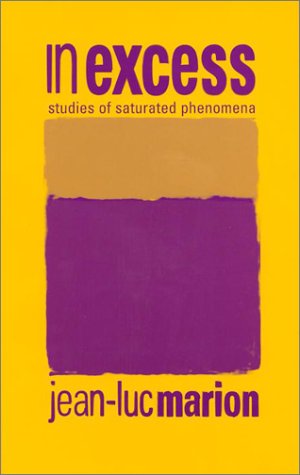

In Excess: Studies of Saturated Phenomena: 27 (Perspectives in Continental Philosophy)
A**N
Phenomenology of Saturated Phenomena
It would be difficult in this short review to get into the substantial claims of Marion's phenomenology, but I am reviewing today to speak to the particular clarity, maturity, and robustness of this work within Marion's larger oeuvre. Since his earlier work, such as God Without Being, Marion has labored to describe phenomenologically the overwhelming excess of the world and God. His earliest work is clearly philosophy of religion, but even if you have little interest in religion or questions of God, Marion's latest work (while never entirely jettisoning the question of God) has gone way beyond that. In Being Given, Marion started to concretely describe what the givenness of phenomena, only achievable by a third, donological reduction. "As much reduction, as much givenness." Past the objectness of Husserl and the beingness of Heidegger, Marion sought to characterize phenomena as first giving themselves before they can show themselves. This thinking arrives at the "saturated phenomena," a phenomenon that gives an excess of intuition over intention (these terms being used in a strictly phenomenological sense). It is a fascinating idea and brings back the "wonder" of philosophy. It privileges the complexity, paradox, and excessiveness of experience over certainty, repeatability, and clarity.So to this book, "In Excess." While "Being Given" did an excellent job of characterizing givenness and saturated phenomena, it lacked phenomenological clarity. He sought much of his material from historical sources, to legitimize his project. Which is important groundwork, but not the heart of the matter. Also, he spent a great deal of time working through a phenomenology of the gift, which was indeed interesting and engaging, but was in the end just an analogue to givenness as such. In "In Excess" on the other hand, Marion sticks strictly to the phenomena and its deeply rewarded for it. He engages in a phenomenology of the saturated phenomena, describing mundane experiences, such as lecture in a lecture hall, as "eventmental" phenomena, as well as friendship, painting, the body, etc. He is still able to make his larger claims about givenness as such, the adonee (the gifted, his response to the subject as transcendental I or Dasein), but they reveal themselves in the phenomena, not in theoretical thinking. Therefore, I think this book is a greater work of phenomenology and consequently make his overall philosophy a lot clearer. Themes from all of his previous works come in, but wrapped up in phenomenological description and therefore grounded in experience and more robust. It is a great testament to how powerful phenomenology can be when done well, and how much better it can describe the complexity of phenomena than other methodologies.If you are interested in Marion's project but have not quite been able to get your head around it, I urge you to read this book. It certainly demands a very solid background in phenomenology, Heidegger, Husserl, Derrida, Descartes, Kant, it is a rewarding text and its very clear and readable if you do in fact have a background in continental philosophy.
Trustpilot
1 month ago
4 days ago